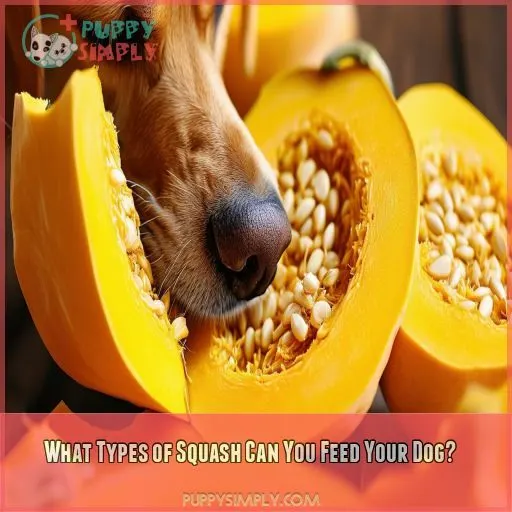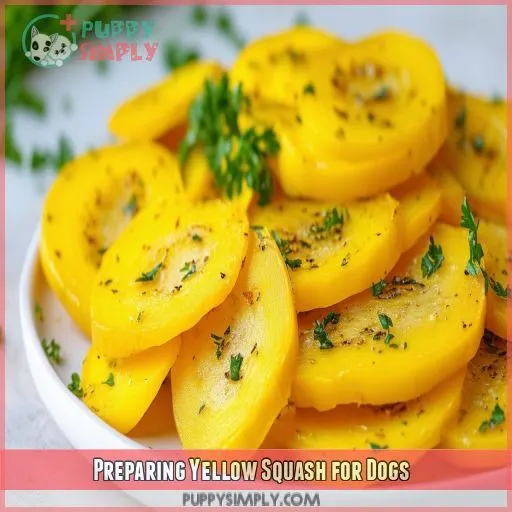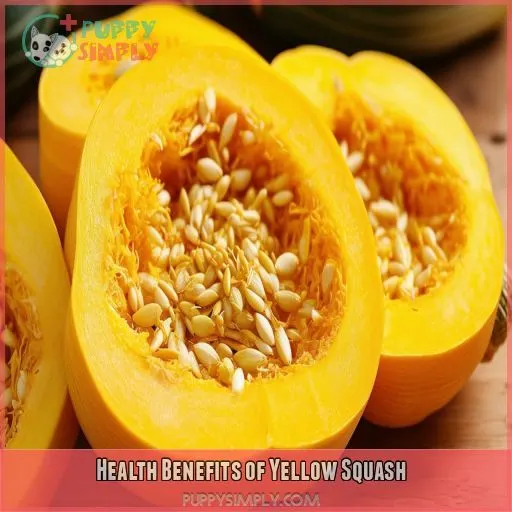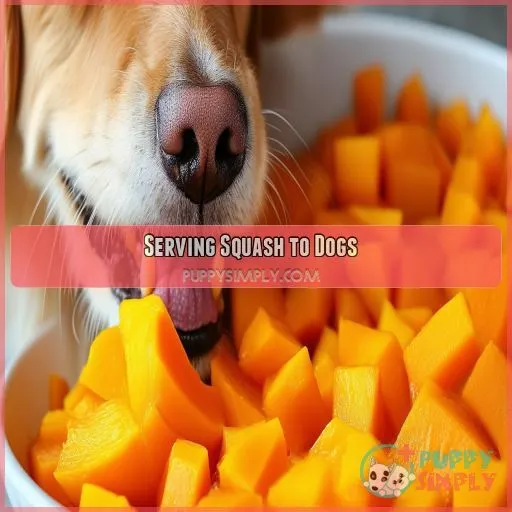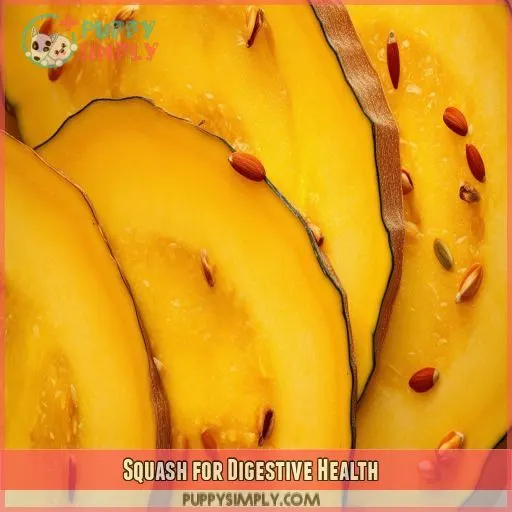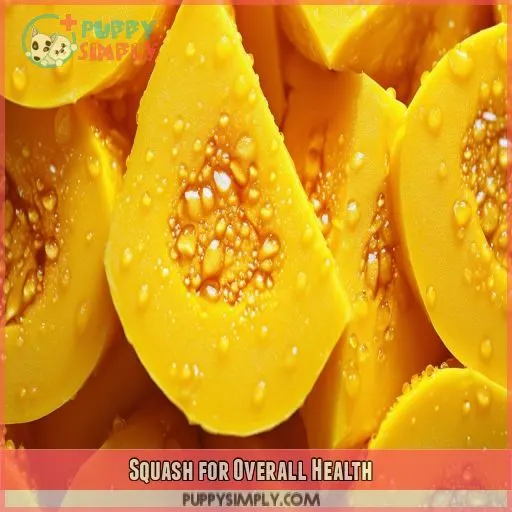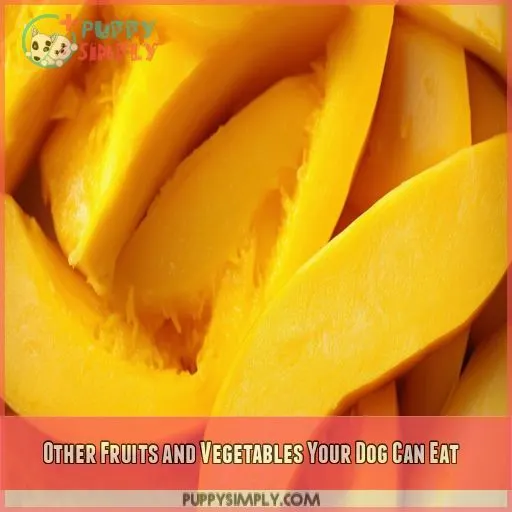This site is supported by our readers. We may earn a commission, at no cost to you, if you purchase through links.
 You might be wondering if it’s safe to share some of your yellow squash with your furry friend.
You might be wondering if it’s safe to share some of your yellow squash with your furry friend.
Can dogs eat yellow squash? The short answer is yes, but with some important caveats.
In this article, we’ll explore the benefits of this superfood for dogs and provide guidelines for preparing and serving it safely.
We’ll also suggest some alternative fruits and veggies your dog can enjoy.
Table Of Contents
- Key Takeaways
- Can Dogs Eat Yellow Squash?
- What Types of Squash Can You Feed Your Dog?
- Preparing Yellow Squash for Dogs
- Health Benefits of Yellow Squash
- Serving Squash to Dogs
- Squash for Digestive Health
- Squash for Overall Health
- Other Fruits and Vegetables Your Dog Can Eat
- Frequently Asked Questions (FAQs)
- Can my dog eat cooked yellow squash?
- How to prepare yellow squash for dogs?
- Can dogs eat squash with skin?
- How much squash should I give my dog?
- How much yellow squash can I give my dog?
- Can I feed my dog raw yellow squash?
- Can I give my dog yellow squash seeds?
- Is yellow squash better than other types of squash for my dog?
- What are the risks of feeding yellow squash to my dog?
- Conclusion
Key Takeaways
- Yellow squash is a dog-friendly superfood, packed with vitamins and fiber, offering a range of health benefits for your pup.
- It’s important to prepare and serve yellow squash safely to dogs, avoiding the seeds, skin, and rind, as well as any toxic ingredients like onion, salt, and garlic.
- Butternut, pumpkin, zucchini, and acorn squash are all great options for dogs, offering unique health benefits and providing variety in their diet.
- Squash is a versatile treat that can aid in digestion, weight management, and overall health for dogs, making it a nutritious addition to their meals.
Can Dogs Eat Yellow Squash?
Yes, dogs can eat yellow squash, but there are some precautions to keep in mind. While it’s a healthy addition to their diet, providing essential vitamins and minerals, always remove the seeds, skin, and rind before serving it to your dog.
Squash Safety for Dogs
Squash is generally safe for dogs to eat, but there are a few risks to keep in mind. First, always remove the seeds, skin, and rinds of the squash before feeding it to your dog, as these can be difficult for them to digest.
Additionally, when preparing squash for your dog, avoid adding any seasonings, especially salt, onion, or garlic, as these can be toxic to dogs.
Benefits of Squash for Dogs
Squash is a great treat for your dog, offering a range of health benefits. Here are some of the key advantages:
- Fiber-rich: Essential for digestive health, helping your dog stay regular and aiding in weight management.
- Vitamin-packed: Squash contains vitamins A, B, and C, supporting vision, cell function, and immune health.
- Antioxidant power: Beta-carotene, a type of antioxidant in squash, protects your dog’s cells from damage.
- Hydration and fur boost: Squash can help keep your dog hydrated and may even give their coat a beautiful shine.
What Types of Squash Can You Feed Your Dog?
Thinking about feeding your furry friend squash? There are several varieties that are safe and nutritious options. Butternut squash, pumpkin, zucchini, and acorn squash are all great choices, each with their unique benefits.
Butternut Squash for Dogs
Butternut squash is a great treat for your dog. It’s rich in vitamin C, potassium, and manganese, offering a range of health benefits. Always serve it cooked, without any seasonings, and introduce it to your dog’s diet gradually.
Pumpkin for Dogs
Pumpkin is a great treat for your dog. It’s a good source of fiber and beta-carotene, which supports your dog’s digestive and overall health.
When feeding pumpkin to your dog, make sure to use plain, unsweetened pumpkin. Don’t feed your dog pumpkin pie filling, as it often contains xylitol, an artificial sweetener that’s toxic to dogs.
Zucchini for Dogs
Zucchini is a great choice for dogs because it’s easily digestible and packed with health benefits. Here are some reasons why zucchini is a fantastic addition to your dog’s diet:
- It’s rich in vitamin B6, which helps regulate metabolism and keep your dog’s energy levels stable.
- Zucchini has a high water content, which can help increase your dog’s hydration levels, especially during the hot summer months.
- It’s a gentle vegetable on a dog’s digestive system, making it a good option for dogs with sensitive stomachs.
- The fiber in zucchini can help support healthy digestion and keep things moving smoothly through your dog’s intestinal tract.
Acorn Squash for Dogs
Acorn squash is another safe and healthy option for your dog. It’s packed with magnesium, which helps your dog’s body efficiently process other minerals. It also contains various B vitamins, which are essential for overall health and well-being. As with other types of squash, be sure to remove the seeds, skin, and rind before serving.
Preparing Yellow Squash for Dogs
When preparing yellow squash for your dog, keep it simple. Boil the squash without any seasoning, mash it up, and avoid adding any salt or flavorings.
Boiling Yellow Squash
When preparing yellow squash for your dog, boiling is a great option. Here’s how to do it:
- Fill a pot with water and bring it to a boil.
- Cut the yellow squash into small pieces, removing the seeds, skin, and rind.
- Carefully place the squash pieces into the boiling water.
- Cook for a few minutes until tender.
- Drain the squash and let it cool before serving.
Mashing Cooked Yellow Squash
Once the yellow squash is boiled, it’s time to mash it up! The texture and consistency of the mashed squash are important. You want to achieve a smooth, creamy consistency without any lumps. Here are some tips to achieve the perfect mash:
- Use a potato masher or fork to mash the squash.
- Add a small amount of water if the squash is too dry and not mashing easily.
- Make sure the squash is well-mashed to avoid any large chunks that could be a choking hazard for your dog.
- Mix the mashed squash with your dog’s regular food for a nutritious boost.
Avoiding Seasonings
When preparing yellow squash for your dog, it’s important to steer clear of certain seasonings. A pinch of pepper or spices is generally safe, but be cautious with salt. Excessive salt can be harmful to dogs, so it’s best to avoid it altogether. Some common seasonings like onion and garlic can also be toxic to dogs, so they should be avoided. Here’s a quick reference table for safe and toxic ingredients:
| Safe Ingredients | Toxic Ingredients |
|---|---|
| Pepper | Onion |
| Spices | Garlic |
| Dog Food Supplements | Salt |
Health Benefits of Yellow Squash
Yellow squash is a nutritional powerhouse for your dog. It’s packed with vitamins A, B, and C, as well as magnesium, phosphorus, manganese, potassium, and fiber. These nutrients work together to keep your dog physically healthy and help their internal organs function properly.
High in Fiber and Vitamins
Yellow squash is a super-healthy treat for your dog, packed with fiber and vitamins. It’s a great way to keep your dog’s digestion on track and help them feel full, which is especially beneficial if your furry friend needs to shed a few pounds. It supports healthy digestion, but it also keeps your dog’s weight in check.
Antioxidant Properties
Yellow squash is a nutritional powerhouse for your dog, packed with vitamins and minerals. It’s also a great source of beta-carotene, a powerful antioxidant that protects your dog’s cells from damage.
Supporting Overall Health
Yellow squash supports your dog’s overall health in a variety of ways:
- It’s rich in vitamins A, B, and C, which are essential for maintaining proper organ function and supporting your dog’s vision.
- The magnesium, phosphorus, and potassium in yellow squash contribute to healthy bodily functions.
- The fiber content aids digestion and helps your dog feel full, making it a great option for weight management.
- Its antioxidant properties, provided by beta-carotene, protect your dog’s cells from damage.
Serving Squash to Dogs
When serving squash to your dog, it’s best to steam or roast it first to make it easier for them to digest. Always serve squash plain, without any butter or seasonings, as some common ingredients like onion, salt, and garlic can be toxic to dogs.
Steaming or Roasting Squash
Steaming or roasting squash is a great way to prepare this healthy veggie for your dog. Cooking methods like steaming and roasting make squash easier for your dog to digest.
Serving Squash Plain
Squash is best served plain, without any butter or seasoning. Here are three key tips to keep in mind:
- Avoid adding butter or any type of oil to the squash.
- Don’t season the squash with onion, salt, or garlic salt, as these are toxic to dogs.
- Always introduce new foods to your dog’s diet slowly and in small amounts to avoid any digestive upset.
Avoiding Toxic Ingredients
When serving squash to your dog, it’s important to avoid toxic ingredients.
Stay away from seasonings like onion, salt, and garlic salt, which are harmful to dogs.
Always serve squash plain.
Additionally, be cautious of toxic compounds like cucurbitacin, which is naturally found in squash.
While it’s typically safe, poor growing conditions or cross-pollination can increase cucurbitacin levels, leading to toxic squash syndrome, causing vomiting, diarrhea, and abdominal pain.
Squash for Digestive Health
Plain pumpkin is a well-known home remedy for soothing your dog’s upset stomach. Squash is also a great aid in weight management as it makes dogs feel full, and its fibre content promotes healthy digestion.
Soothing Stomach Upsets
Plain pumpkin is a well-known home remedy for dogs with upset stomachs. It can help calm your dog’s digestive system and is high in fiber, which keeps your dog feeling full. This makes it a great option for overweight dogs or those on a diet.
Aiding in Weight Management
If your dog needs to shed a few pounds, squash can be a great addition to their diet. It’s low in calories but still filling, thanks to its fiber content. This makes it a smart choice for dogs who need to watch their weight.
Promoting Healthy Digestion
Squash is a great way to promote healthy digestion in dogs.
The fiber in squash helps keep things moving through your dog’s digestive tract, and can even help calm an upset stomach.
If your dog is feeling under the weather, try feeding them some plain pumpkin—it’s a common home remedy for mild stomach issues.
Just be sure to introduce new foods slowly and always consult your vet if you have any concerns.
Squash for Overall Health
Squash is a great way to support your dog’s overall health. It’s packed with vitamins and antioxidants that promote healthy vision and cellular functions, repair body tissues, boost the immune system, and moderate metabolism.
Supporting Vision and Cellular Functions
Besides aiding digestion, yellow squash is also a great source of vitamins and antioxidants that support your dog’s vision and overall cellular health. Here are three key benefits of feeding yellow squash to your dog:
- Vision Support: Yellow squash is rich in vitamin A, which is essential for maintaining healthy vision. It helps keep your dog’s eyes sharp and their eyesight clear.
- Cellular Functions: The beta-carotene in yellow squash acts as a powerful antioxidant, protecting your dog’s cells from damage and supporting their overall health.
- Vitamin B6 Boost: Varieties of squash like zucchini are packed with vitamin B6, which plays a key role in moderating your dog’s metabolism and ensuring their body functions efficiently.
Repairing Tissues and Supporting Immune System
Squash is an excellent source of vitamin C, which is key for repairing body tissues and supporting your dog’s immune system.
Butternut squash, in particular, is a great source of this essential vitamin.
So, if your dog needs a boost in these areas, consider adding some steamed or roasted butternut squash to their diet.
Just be sure to avoid any added salt, seasonings, or sweet fillings, as these can be harmful to our four-legged friends.
Moderating Metabolism
Squash, specifically zucchini, is a great way to help moderate your dog’s metabolism. It’s rich in vitamin B6, which plays a key role in regulating metabolism and keeping your pup’s energy levels stable.
- Vitamin B6 Benefits: This vitamin helps your dog’s body turn food into energy, supporting overall health and keeping them active.
- Metabolism Regulation: By aiding in the conversion of food into energy, vitamin B6 helps regulate your dog’s metabolism, ensuring they maintain a healthy weight.
- Natural Energy Boost: Dogs that get enough vitamin B6 tend to have more stable energy levels, so they can stay active and playful without the need for artificial supplements.
Other Fruits and Vegetables Your Dog Can Eat
There are plenty of other fruits and vegetables that your dog can eat, including green beans, bell peppers, celery, cucumbers, broccoli, carrots, and cauliflower. For fruits, bananas, apples, kiwis, oranges, cantaloupe, blueberries, dates, and papaya are all safe options, but remember to remove the seeds and peels.
Green Beans and Bell Peppers
Green beans and bell peppers are great safe treats for your dog. They’re packed with nutritional value and make excellent dog snacks. Your pup will love the crunchy texture and the vitamins they provide. Just be sure to serve them plain, without any added salt, pepper, or other seasonings that could be harmful to dogs.
Celery and Cucumbers
In addition to green beans and bell peppers, celery and cucumbers are crunchy, fresh, and tasty treats that your dog can enjoy. These vegetables provide a satisfying crunch and a boost of hydration, making them a great option for a quick snack or a fun addition to your dog’s meal.
Broccoli and Carrots
Broccoli and carrots are healthy and safe treats for your dog. They’re crunchy, which is great for your dog’s teeth and gums. Broccoli is packed with vitamins and fiber, while carrots are rich in beta-carotene, which is essential for your dog’s eye health.
Just remember to feed these veggies in moderation and always wash them thoroughly before serving.
Fruits Like Bananas and Apples
Your furry friend can also enjoy a variety of fruits, including bananas, apples (without seeds), berries, and mangoes. Here are some other fruits and vegetables that are safe for your dog to eat:
- Green beans
- Bell peppers
- Celery
- Cucumbers
Frequently Asked Questions (FAQs)
Can my dog eat cooked yellow squash?
Yes, dogs can eat cooked yellow squash. It’s a healthy, nutritious treat. Just be sure to remove the seeds and stem first, as these can be a choking hazard.
How to prepare yellow squash for dogs?
First, peel the squash, gut the seeds, and remove the rind. Then, roast or boil it until soft. Let it cool, then mash it up and serve it to your dog or mix it with their kibble.
Can dogs eat squash with skin?
No, it’s important to remove the skin before feeding your dog squash. It can cause digestive issues.
How much squash should I give my dog?
Squash should be given to dogs in moderation. You can give your dog about one tablespoon if they’re small, a couple of tablespoons if they’re medium-sized, and up to a 1/4 cup if they’re large.
How much yellow squash can I give my dog?
How much is too much? Like other veggies, squash should only make up 10% of your dog’s daily diet. So, if your dog needs 450 kcal/day, they can have about 100g of squash, assuming No other treats. Start small, and increase the amount if they tolerate it.
Can I feed my dog raw yellow squash?
Yes, dogs can eat raw yellow squash, but it could be a choking hazard for small dogs. It’s best to cook it first.
Can I give my dog yellow squash seeds?
You should remove the seeds from yellow squash before feeding it to your dog. While a few seeds may not harm your dog, a large amount could cause an intestinal blockage.
Is yellow squash better than other types of squash for my dog?
Yellow squash is great for dogs with diabetes, high cholesterol, or weight issues. But other squashes are better for dogs with digestion issues, like butternut and spaghetti squash.
What are the risks of feeding yellow squash to my dog?
Feeding your dog yellow squash can cause digestive issues, including intestinal blockages if they eat the seeds or skin. Monitor your dog for signs of allergies or an upset stomach.
Conclusion
So, can dogs eat yellow squash? Absolutely! It’s a superfood packed with vitamins and fiber, offering a range of health benefits. But remember, moderation is key. Always prepare it safely, avoiding toxic ingredients and seasonings. Besides yellow squash, there’s a variety of fruits and veggies your dog can enjoy, from butternut squash to apples. Keep their diet interesting and nutritious!

